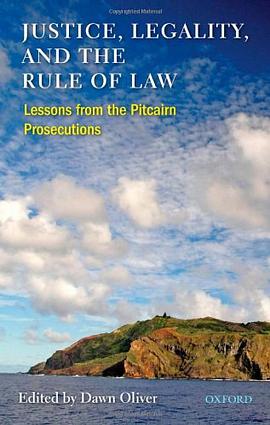

具体描述
A British colony of fifty souls in the Pacific Ocean, Pitcairn Island was settled by the Bounty mutineers and nineteen Polynesians in 1790. In 2004 six Pitcairn men were convicted of numerous offences against girls and young women, committed over a thirty year period, in what appears to have been a culture of sexual abuse on the island. This case has raised many questions: what right did the British government have to initiate these prosecutions? Was it fair to prosecute the defendants, given that no laws had been published on the island? Indeed, what, if any, law was there on this island? This collection of essays explores the many important issues raised by the case and by the situation of a small, isolated community of this kind. It starts by looking at the background to the prosecutions, considering the dilemma that faced the British government when the abuse was uncovered, and discussing the ways in which the judges dealt with the case, as well as exploring the history of the settlement and how colonial law affects it. This background paves the way for an exploration of the philosophical, jurisprudential, and ethical issues raised by the prosecutions: was it legitimate for the UK to intervene, given the absence of any common community between the UK and the island? Was the positivist 'law on paper' approach adopted by the British government and the courts appropriate, especially given the lack of promulgation of the laws under which the men were prosecuted? Would alternative responses such as payment of compensation to the female victims and provision of community support have been preferable? And should universal human rights claims justify the prosecutions, overriding any allegations of cultural relativism on the part of the UK?
作者简介
Dawn Oliver, FBA, is Emeritus Professor of Constitutional Law at University College London. Her research interests are in constitutional reform in the United Kingdom and in comparative constitutional law. Her publications include Common Values and the Public-Private Divide (1999); Constitutional Reform in the UK (2003); The Changing Constitution (6th edition, 2007, with co-editor Jeffrey Jowell), Human Rights and the Private Sphere: A Comparative Study (with co-editor Joerg Fedtke, 2007). She was a member of the Royal Commission on House of Lords Reform, 1999-2000 and of the Fabian Society Commission on the Future of the Monarchy, 2003.
目录信息
1
2 The Pitcairn Prosecutions Paper Legal Systems and the Rule of Law
23
A Legal History
39
A Peculiar Case of the Diffusion of the Common Law
63
An Assessment of Their Historical Context by Reference to the Provisions of Public International Law
93
Why Claims of Cultural Uniqueness Cannot be Used to Justify Violations of Basic Human Rights
131
7 Rights and Duties on Pitcairn Island
157
8 Legality Reciprocity and the Criminal Law on Pitcairn
183
Afterword
221
Steven Raymond Christian and Others v The Queen 2006 UKPC 47
231
Official Correspondence
259
Outline Pitcairn Island Chronology
267
References
271
Index
· · · · · · (收起)
读后感
评分
评分
评分
评分
用户评价
相关图书
本站所有内容均为互联网搜索引擎提供的公开搜索信息,本站不存储任何数据与内容,任何内容与数据均与本站无关,如有需要请联系相关搜索引擎包括但不限于百度,google,bing,sogou 等
© 2026 onlinetoolsland.com All Rights Reserved. 本本书屋 版权所有



















